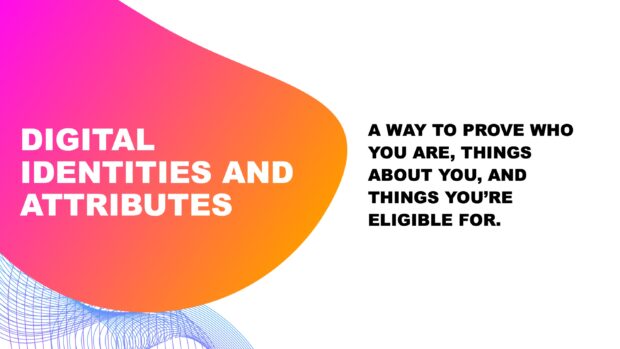
The last time I tried to get into a nightclub, I got asked for ID.
To prove my age, I handed over my driving license to the person on the door. They looked at it, then scanned it to keep a digital copy of it.
In handing over my driving licence, I exposed my full name, my full date of birth, my home address, my sex, and my signature. Not only had I handed this information over to a complete stranger, but there is now an electronic copy of my driving licence and all my personal data stored on someone else’s IT system (hopefully securely).
It doesn’t need to be this way.
The venue staff only needed to confirm one attribute of my identity; that I was over 18.
If I was able to use a digital identity, that could have been all they were given access to. Using a digital verification service – like an app on my phone – would likely have been a safer and more privacy-preserving way to prove who I am.
Not just about proving your age
This is something that happens to me less often than it used to as I get older, but it’s something that happens to huge numbers of people every week. It’s not just about nightclubs, and it’s not just about proving how old you are.
Experiences like this one happen to all of us, all the time. Think about the last time you picked up a parcel, took out a mobile phone contract, applied for something on credit or registered with a local GP.
To pass through the many and varied identity and eligibility checks we all do from time to time, we hand over driving licences, passports, bank statements, utility bills and more. In many cases, these documents are copied and stored for months or years on end as proof that checks were carried out.
These processes can feel really invasive, and they’re a gold-mine for fraudsters and criminals if they ever managed to get hold of all that data. These are problems that digital identities – and the digital verification services that enable you to use them – can help to avoid.
Digital identities help you to prove things about you
A “digital identity”, then, is just digital representation of who you are, things about you and things you might be eligible for. Individual pieces of information about you, that together make up your identity, are what we call “attributes”.
Using a digital verification service from a trusted provider can give you more control over what attributes of your identity you share with others compared to the pieces of paper and plastic we use today. And that control includes whether or not you use a digital identity service at all – if you’d prefer to rely on your existing paper documents, government isn’t taking those away.
Our work to create clear standards for digital verification services in the UK means that there are now around 50 companies offering privacy-protecting, safe and secure services in the UK. And it’s now easier to know which services you can trust. We’ve published a list of certified services on GOV.UK.
Sign up to email alerts to receive an update whenever we publish a new blog post.
